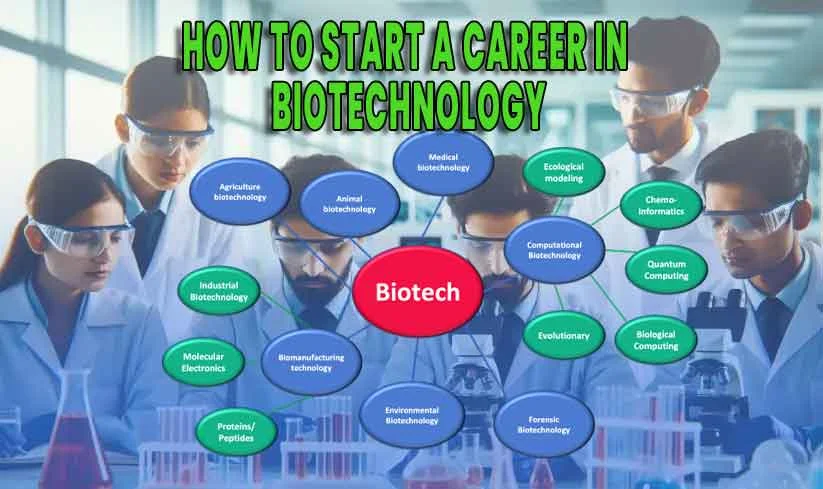How to Start a Career in Biotechnology: A Comprehensive Guide
Biotechnology is a rapidly growing field that combines biology, chemistry, and technology to develop innovative solutions in healthcare, agriculture, environmental science, and industrial processes. With advancements in genetic engineering, pharmaceuticals, and bioinformatics, biotechnology offers diverse career opportunities for aspiring professionals.
If you're passionate about science and technology and want to make a meaningful impact, a career in biotechnology could be the right path for you. This guide will walk you through the essential steps to launch a successful career in biotechnology, covering education, skills, job opportunities, and career growth strategies.
1. Understand the Biotechnology Industry
Before diving into a biotechnology career, it's crucial to understand the industry's scope and key sectors:
Key Areas of Biotechnology
- Medical Biotechnology: Developing drugs, vaccines, gene therapies, and diagnostic tools.
- Agricultural Biotechnology: Improving crop yields, pest resistance, and genetically modified organisms (GMOs).
- Industrial Biotechnology: Producing biofuels, enzymes, and biodegradable materials.
- Environmental Biotechnology: Waste management, pollution control, and bioremediation.
- Bioinformatics: Using computational tools to analyze biological data (genomics, proteomics).
Understanding these sectors will help you choose a specialization that aligns with your interests.
2. Educational Pathways in Biotechnology
A strong educational foundation is essential for a career in biotechnology. Here are the typical academic routes:
A. Undergraduate Degree (Bachelor’s Level)
Most entry-level biotechnology jobs require at least a bachelor’s degree in:
- Biotechnology
- Biology (Molecular Biology, Microbiology, Biochemistry)
- Biomedical Engineering
- Genetics or Genomics
- Chemistry or Chemical Engineering
Key Subjects to Focus On:
- Cell Biology
- Genetics & Genomics
- Microbiology
- Biochemistry
- Biostatistics & Data Analysis
- Lab Techniques (PCR, Gel Electrophoresis, CRISPR)
B. Postgraduate Studies (Master’s & Ph.D.)
For advanced roles in research, development, or leadership, a master’s or Ph.D. is beneficial. Specializations include:
- Genetic Engineering
- Pharmaceutical Biotechnology
- Synthetic Biology
- Bioinformatics
C. Certifications & Short Courses
Supplement your degree with certifications in:
- Good Laboratory Practices (GLP)
- Clinical Research
- Regulatory Affairs
- Bioinformatics Tools (Python, R, Bioconductor)
3. Gain Practical Experience
Biotechnology is a hands-on field, so gaining real-world experience is crucial.
A. Internships & Research Projects
- Look for internships at biotech companies, research labs, or pharmaceutical firms.
- Participate in university research projects or collaborate with professors.
B. Laboratory Skills
Master essential lab techniques such as:
- DNA/RNA extraction
- Cell culture
- Protein purification
- CRISPR-Cas9 gene editing
C. Industry Exposure
Attend:
- Biotechnology conferences
- Workshops on emerging trends (AI in biotech, personalized medicine)
- Networking events with professionals
4. Develop Essential Skills for Biotechnology Careers
Beyond technical knowledge, employers look for these key skills:
A. Technical Skills
- Molecular biology techniques
- Data analysis (Python, R, MATLAB)
- Bioinformatics & computational biology
- Knowledge of regulatory compliance (FDA, EMA guidelines)
B. Soft Skills
- Problem-solving & critical thinking
- Communication (writing research papers, presenting findings)
- Teamwork & collaboration
- Project management
C. Business & Entrepreneurship Skills (For Leadership Roles)
- Understanding biotech startups
- Intellectual property & patents
- Fundraising & venture capital
5. Explore Career Opportunities in Biotechnology
Biotechnology offers diverse career paths based on your specialization:
A. Research & Development (R&D)
- Research Scientist – Conduct experiments, publish findings.
- Bioinformatician – Analyze genomic data using AI/ML.
- Genetic Engineer – Work on CRISPR and gene therapy.
B. Healthcare & Pharmaceuticals
- Clinical Research Associate (CRA) – Oversee drug trials.
- Biomedical Engineer – Design medical devices.
- Regulatory Affairs Specialist – Ensure compliance with laws.
C. Agriculture & Food Science
- Agricultural Biotechnologist – Develop pest-resistant crops.
- Food Scientist – Improve food safety & sustainability.
D. Environmental Biotechnology
- Environmental Biotechnologist – Work on waste treatment & biofuels.
E. Business & Consulting
- Biotech Consultant – Advise companies on innovations.
- Patent Analyst – Protect biotech inventions legally.
6. Build a Strong Professional Network
Networking is vital in biotechnology. Here’s how to connect with industry professionals:
Join Biotechnology Associations:
Biotechnology Innovation Organization (BIO)
International Society for Biotechnology
Local biotech meetups
LinkedIn & Online Communities:
Follow biotech leaders, engage in discussions.
Join forums like ResearchGate or Biostars.
Mentorship:
Seek guidance from experienced professionals.
7. Stay Updated with Industry Trends
Biotechnology evolves rapidly. Stay informed by:
- Reading journals (Nature Biotechnology, Journal of Biotechnology).
- Following biotech news (STAT News, FierceBiotech).
- Taking online courses (Coursera, edX, Udemy).
8. Apply for Jobs & Prepare for Interviews
A. Job Search Strategies
- Check job portals (Biospace, LinkedIn, Indeed).
- Apply to biotech hubs (Boston, San Francisco, Berlin, Bangalore).
B. Resume & Cover Letter Tips
- Highlight lab skills, research experience, and publications.
- Tailor applications to job descriptions.
C. Interview Preparation
- Expect technical questions on lab techniques.
- Be ready to discuss your research projects.
9. Consider Entrepreneurship & Startups
If you’re innovative, consider launching a biotech startup. Steps include:
- Identifying a market need (e.g., new drug delivery systems).
- Securing funding (grants, venture capital).
- Building a team of scientists and business experts.
10. Future of Biotechnology Careers
Emerging trends shaping biotech careers:
- AI & Machine Learning in Drug Discovery
- CRISPR & Gene Editing Therapies
- Personalized Medicine & Genomics
- Sustainable Biomanufacturing
Conclusion
Starting a career in biotechnology requires a mix of education, hands-on experience, and continuous learning. Whether you want to work in research, healthcare, agriculture, or entrepreneurship, biotechnology offers exciting opportunities to innovate and solve global challenges.
By following this guide—earning the right degree, gaining lab experience, networking, and staying updated—you can build a successful and fulfilling career in biotechnology.
Take the first step today and be part of the next biotech revolution!







